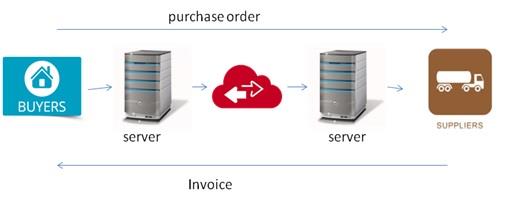- Business Concepts ›
- Operations and Supply Chain ›
- EDI (Electronic Data Interchange)
EDI (Electronic Data Interchange)
Definition & Meaning
This article covers meaning & overview of EDI (Electronic Data Interchange) from operations perspective.
What is meant by EDI (Electronic Data Interchange)?
Electronic Data Interchange is the process of exchanging structured data between two users by the use of standard electronic means. The users can be two computers in an organization or two different organizations altogether.
All the data that was exchanged using paper documents before has been replaced by EDI. Departments in organization like accounts, purchase, etc. replaced their paper work by EDI. EDI works through a series of data messages exchanged between the users in a standard format indicating the documents to be transmitted that can be in structured electronic format or physical transmission through electronic storage media.
Human intervention is generally not present in EDI except for in cases of errors or where manual intervention is required to override the process.
The benefit of EDI involves:
• Cost reduction due to use of electronic medium, instead of paper
• Reduction in labor time
• Faster business transaction
• Minimum errors due to standard formats
• Environmental benefits as no paper is used
Associated supply chain benefits due to faster transactions include reduction in inventory, better warehouse utilization, low stock out etc. The drawback includes need of resources in order to implement EDI that adds to cost. But it may be offset by increase in operational efficiency.
In order to implement EDI, trading partner needs connectivity (e.g. internet, leased lines etc), computer systems, software installation and manpower. These resources have to be tested among trading partners for further use. Upgrades have to be installed time to time.
Example: In order to purchase material from a supplier, a buyer has to provide information on product, quantity, specification and time of delivery. Once the buyer has got these details approved from its office, a purchase order is issued to the supplier. In EDI, purchase order is transformed into standard format called ‘850 purchase order’ which is transmitted to supplier via system using internet or other connectivity. After receiving the purchase order, supplier processes it and sends the desired product in specified quantity. In EDI, data security is highly recommended that is done through password, encryption etc.

Figure: EDI system
Hence, this concludes the definition of EDI (Electronic Data Interchange) along with its overview.
This article has been researched & authored by the Business Concepts Team which comprises of MBA students, management professionals, and industry experts. It has been reviewed & published by the MBA Skool Team. The content on MBA Skool has been created for educational & academic purpose only.
Browse the definition and meaning of more similar terms. The Management Dictionary covers over 1800 business concepts from 5 categories.
Continue Reading:
What is MBA Skool?About Us
MBA Skool is a Knowledge Resource for Management Students, Aspirants & Professionals.
Business Courses
Quizzes & Skills
Quizzes test your expertise in business and Skill tests evaluate your management traits
Related Content
All Business Sections
Write for Us